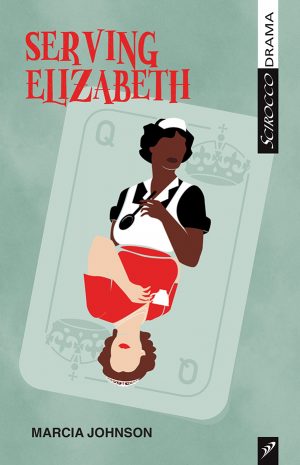Posted December 4, 2023
Class Notes – Elaine Ávila
This month, playwright, screenwriter, educator, and dramaturge Elaine Ávila tells us about her experience of using Marcia Johnson’s plays in her acting course at the University of Fraser Valley
In 2021, Marcia Johnson and I were invited, via email, by playwright/scholar/director Aida Jordão, to the launch of the first mural commemorating the Portuguese Cleaning Women of Toronto and their courageous strike of the 1970s. The mural was created by esteemed international artist VHILS, and entitled “Scratching the Surface,” because it was etched into the surface of the building, but the title also evokes the gesture of finally acknowledging these immigrant women’s existence. As a writer of Azorean Portuguese descent, I was ecstatic when I opened the email, my breath suspended. I plotted ways to get from the West Coast to Toronto in a few weeks. Maybe I could get out of this small corner of my bedroom where I’d been teaching online for the entire pandemic? Then I exhaled. I couldn’t go. I had directing and teaching responsibilities. I sent my regrets. Then Marcia wrote back to me to say she would be out in Vancouver and asked if I knew of any university teaching opportunities. At the time, I was guest directing a Climate Change Theatre Action project and teaching acting for the University of the Fraser Valley (in person at last). But in terms of my acting class, I was stuck. I stared at Marcia’s missive, glowing on the small screen I’d been staring at for years, my only connection to the outside world. Maybe her email could spark something.
I was stuck because of my experiences as an Azorean Portuguese theatre creator. I know that IBPOC, LGBTQ2+ students need to see writers like themselves on the syllabus, and in the university theatre season, so that they see a place for themselves in the field (or at least they are inspired to carve out one). I updated my acting pedagogy by working with more recent publications, such as Black Acting Methods: Critical Approaches, edited by Sharrell Luckett and Tia M. Shaffer,and The Mythic Actor by one of my teachers, Marissa Chibas. I have been passionate about equity for decades. When I founded the LEAP Playwriting Program at the Arts Club, my goal was that Vancouver’s stages begin to look more like Vancouver’s population. I am member of and signatory to two anti-racist Theatre Exchanges: We See You W.A.T. (https://www.weseeyouwat.com) and Maada’oonidiwag Anti-Racist ‘Canadian’ Theatre Exchange. I am a member of The Welcome Table Movement and contributor to their book https://jadtjournal.org/2021/04/08/casting-a-movement-the-welcome-table-initiative/
But as an acting professor, I was coming up against the problem many acting professors face—if over 70% of my students are identifying as “white” or are “white passing”—what do I do? (I use the word “white” with care. Claudia Rankine, my colleague while I was at Pomona College, a poet of Jamaica descent, has founded the “Racial Imaginary Institute” to study whiteness and race as a construct.) By the time Marcia sent her email, approximately 30% of my acting students happened to mention that they were from Nigeria, Turkey, Uzbekistan, Japan, the Sto:Lo Nation, Argentina, and the Punjab. As I looked through my favourite contemporary plays, many playwrights from these communities wrote plays that were exclusively to be cast from those communities. Given the history of “black face” and “yellow face,” it was starting to seem better to go with plays for all “white” casts. “Better for an IBPOC actor to play a white role,” I reasoned. But if we were going to only be doing scene study by “white” writers, our imaginations would not have the opportunity to be engaged by a wider range of theatrical visions, of community and cultural understandings. I could not meet my pedagogical goals of welcoming everyone to the field, of exploring the richness of our current playwriting landscape.
Meanwhile, the Climate Change Theatre Action (CCTA), an initiative I co-founded, now reaching 45,000 worldwide, was tantalizing me with what might be possible. I was directing plays by Keith Barker, Yvette Nolan, Himali Kothari, Corey Payette, Madeline Sayet and other IBPOC writers who had expressly stated that the roles they had written could be played by actors of any ethnicity. I could see why so many acting programs were teaching the CCTA collections.
When Marcia Johnson reached out, I suddenly got unstuck. What if I could teach an acting unit featuring her, and her plays, which are for written for mixed race casts? I asked if she would be amenable to this. Would she willing to come in as a special guest to watch the students act in her plays? She said yes. I wrote an email to the Dean of the College of Arts, amazing theatre scholar Dr. Heather Davis-Fisch, asking for the funding. She also said yes. Next, I designed a scene study unit featuring Serving Elizabeth, Jumping Ship, Kate and Bianca, English Please and Single Use. It was utterly delightful to delve into the complex histories in Marcia Johnson’s plays and her wonderfully actable dialogue. I asked her specifically about casting the black characters. Marcia said that she preferred those roles go to a black actor first, then an IBPOC actor. I followed her instructions.
As I coached the actors, I was deeply inspired by Marcia’s vision. One of her plays, Jumping Ship, is about her ancestors in Jamaica and Scotland. Like the mural in Toronto, we were at last, exploring this history, or “scratching the surface.” And this led us quickly to wonderful depths. Marcia’s work is lively, engaging, deep, powerful, and fascinating. Some of her plays, including Serving Elizabeth and Single Use (about dating and dealing with the climate crisis at the same time) are quite funny. Meanwhile, Serving Elizabeth was playing in theatres across Canada, so the students and I could Zoom into a production. By the time she came to visit, students had been rehearsing for weeks.
Then we found ourselves in the midst of a climate disaster. The entire campus was shut, due to flooding. There were rapidly rising Covid numbers, again. We pivoted back on line. I gave lessons on “acting within a frame.” Some students were, fortunately, able to act together, in each other’s “bubbles.” Others were trapped in dorm rooms and their parents’ basement suites. Even though it was discouraging to be back online, the students had an extra sense that their work mattered, because Marcia Johnson was still going to join us. We revelled in the experience of seeing her plays in dialogue with each other. When Marcia Zoomed in, the actors showed unwavering commitment and deep enthusiasm. Marcia was a gracious, fun, and informative guest. Because she is also an accomplished actor, she was extremely adept at encouraging and welcoming these first-year actors to the field. She spoke powerfully to everyone about creating roles for yourself when you don’t see yourself represented. I thanked her in person, but also whispered it to myself, in my heart: thank you. Thank you for joining me in welcoming the next generation of theatre artists. Thank you for your wonderful plays.
It’s now Fall 2023. I am teaching playwriting at Douglas College. While redesigning my syllabus during the summer, I decided to teach Serving Elizabeth. Why? I love a class where we go out to the world, and where we invite the world in. I have students with many barriers to education, from economic to physical—such as vision loss, not affording the text, or long hours working and commuting. Teaching Serving Elizabeth actively lowers barriers. Pedagogically, the play is a great inspiration to anyone who finds that, like the Portuguese Cleaning Women, their story is missing.
As Karen Fricker of the Toronto Star notes: “The dual time structure [of Serving Elizabeth] allowed Johnson to both represent the history that she found lacking in The Crown and comment on the role that art can play in documenting that history.” And going out and inviting the world in? As students began reading the text, they went out to research Stratford and CBC podcasts, and then presented on them in class, as possible opportunities for themselves. And with this article, the one you are reading now, the world came to us. The whole class perked up with inspiration, when I was invited to write it. What we were doing in class meant something to Marcia Johnson and Scirocco Publishing? My beginning playwriting student who presented on Marcia Johnson, Rhia Nagra, was so inspired and happy to hear of this article, that she allowed me to quote directly from her presentation:
“Marcia Johnson is a Jamaican-born, Canadian-raised playwright, actor, dramaturge, and librettist. She also developed a series entitled “Hello, it’s Marcia” over the pandemic where she narrates children’s books online; there are over 200 readings available on her website. Her play, Serving Elizabeth, was first premiered in Kamloops in 2020. Johnson was inspired to write Serving Elizabeth after watching Netflix’s The Crown which follows the life of Queen Elizabeth. The episode in particular that inspired her was about a royal visit to Kenya, which Johnson felt did not give justice to the Kenyan experience nor did it provide adequate space for black voices in the face of colonialism. I felt similarly when watching the episode many years ago and admire Johnson for taking on colonialism with a critical and careful view as she did in the play. The play gives agency to individuals that are often neglected in history books and fictional historic retellings. Discussion Question: Why do you think it’s important to tell historical fiction stories from an intersectional lens? What power or impact can come from telling neglected stories of the past?”
As I listened to my class wrestle with Rhia Nagra’s question, discussing their own exclusions and passions for telling neglected stories, I thanked Marcia Johnson once again. For partnering with me in welcoming upcoming theatre artists to the field with her extraordinary work, creating complex worlds for students to explore, for inspiring the next generation to tell neglected, intersectional stories. Pedagogical goals met! Muito obrigada, as we say in the Azores. Thank you, Marcia. Thank you Scirocco for publishing her play and making it available in classrooms everywhere.
-
 Serving ElizabethPrice range: $9.99 through $15.95
Serving ElizabethPrice range: $9.99 through $15.95 -
 Courting Johanna$14.95
Courting Johanna$14.95
